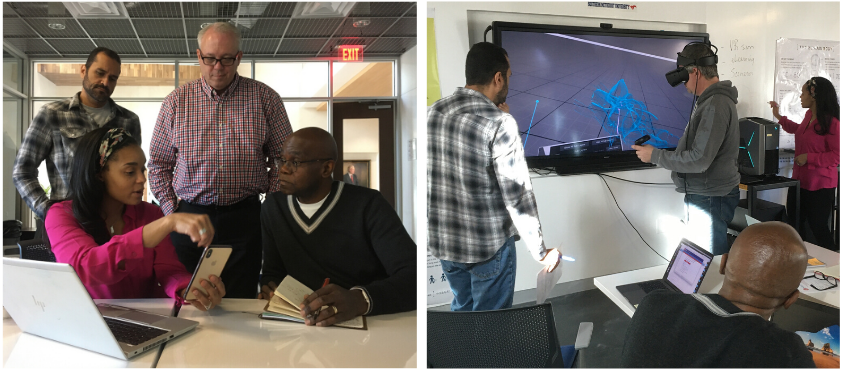
Research
Medical experts, researchers, designers, academics, and students come together at the Center for Global Health Impact to create better global health solutions for the future. The Center's research primarily focuses on leveraging new technologies to increase efficiency, reduce costs, and revolutionize healthcare distribution.
Low-cost Virtual Reality Training to Improve Postpartum Care

An international team of researchers from King’s College London, Southern Methodist University, University of North Carolina at Chapel Hill, University of Texas Southwestern Medical Center and the University of Zambia is developing techniques to train surgeons using low-cost eLearning tools and virtual reality, which can help improve the acquisition of knowledge and skills without patient contact.
Surgery is one of the most crucial domains of global medicine, yet most low- and middle-income regions have stark deficits in both the absolute numbers of surgeons and their level of expertise to perform complex surgical procedures. Of the many types of emergency surgical interventions, some of the most crucial and complex are those required to manage obstetric hemorrhage, the world's most common cause of maternal death.
Funding from the Wellcome Trust is enabling researchers to build and field-test the first general affordable obstetrical virtual reality simulator training platform for the surgical management of obstetrical hemorrhage. This forthcoming training platform will integrate the latest advances in virtual reality technology with traditional hands-on training, and can be easily and affordably delivered within low- and middle-income contexts.
Improving Cancer Surgery through Virtual Reality
Several of the team members working on the Center’s project related to virtual reality and postpartum hemorrhage have also worked on the Center’s project related to virtual reality and cervical cancer surgery.
Cervical cancer is one of the most common cancer-related causes of death in the developing world. Surgery is essential for cervical cancer management, but the current number of trained surgeons in the developing world is vastly inadequate. Therefore, it is imperative to find ways to more effectively and efficiently train surgeons to treat cervical cancer patients in the developing world.
The Center’s Virtual Reality Surgery Simulator project aims to reduce the time and cost required to train surgeons to perform radical hysterectomy procedures. When combined with clinical training, VR technology has the potential to significantly reduce the time and cost of surgical training in lower-income contexts. Studies of VR training and laparoscopic surgery have shown that the training time required for a surgical novice to reach the skill level of an intermediately skilled surgeon can be halved for some surgical procedures. Similarly, VR-trained surgeons are less likely to make surgical errors on VR-trained procedures than those receiving standard surgical training. The virtual reality for cancer surgery project utilizes inexpensive, off-the-shelf equipment, resulting in a total equipment cost to the end user of less than $2,000 USD. This presents an opportunity to reduce the per-surgeon cost of surgical training and thereby increase the availability of appropriately trained surgeons in low-resource settings.
More information on the Virtual Reality Surgery Simulator project is available here.
Empowering Cancer Prevention Leaders with eLearning

To help stem the shortage of trained medical personnel in low-income countries, the Institute has developed low-cost eLearning courseware to train new leaders in cancer diagnosis and treatment. Courses designed by the Institute are currently being used for training by Friends of Africa, Inc., a health organization based in Zambia.
Recent Publications
Ng, P.Y., Bing, E.G., Cuevas, A., Aggarwal, A., Chi, B., Sundar, S., Mwanahamuntu, M., Mutebi, M., Sullivan, R. and Parham, G.P. (2023) Virtual reality and surgical oncology. ecancermedicalscience, 17.
Brown, M. L., Trotter, C. E., Huang, W., Contreras Castro, K., DeMuth, W. D., & Bing, E. G. (2022). COVID-19 and mental health among college students in the southwestern United States. Journal of American College Health, 1-8.
Bing, E. G., Brown, M. L., Cuevas, A., Sullivan, R., & Parham, G. P. (2021). User Experience With Low-Cost Virtual Reality Cancer Surgery Simulation in an African Setting. JCO Global Oncology, 7(1), 435-442.
Parham, G.P.*; Bing, E.G.*, Cuevas, A., Fisher, B., Skinner, J, Mwanahamuntu, M, Sullivan, R., (2019) Creating a low-cost virtual reality surgical simulation to increase surgical oncology capacity and capability, ecancermedicalscience, 13 910
Bing, E.G., Parham, G.P.; Cuevas, A., Fisher, B., Skinner, J, Mwanahamuntu, M, Sullivan, R. (2019) Using low cost virtual reality simulation to build surgical capacity for cervical cancer treatment, Journal of Global Oncology, 5, 1-7.
Ding, X., Larson, E.C., Doyle, A; Donahoo, K.; Rajgopal, R., Bing, E.G. (2019) EduAware: Using tablet-based navigation gestures to predict learning module performance, Interactive Learning Environments, DOI: 10.1080/10494820.2019.1609524
*indicates joint first authorship